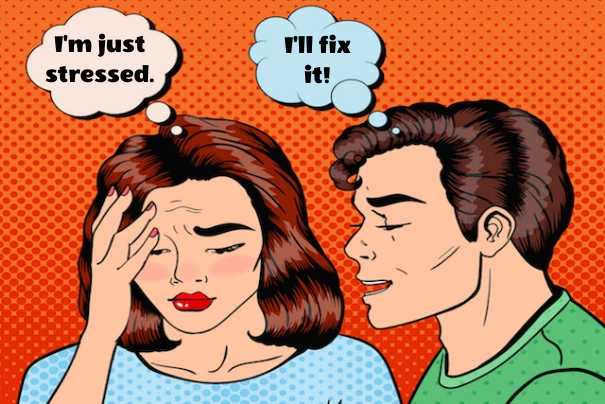The debate over whether yoga is an effective tool for weight loss has been discussed for years.
Many believe that yoga is not fast-paced enough to burn the number of calories required for true weight loss. Others swear by yoga and say it's an extremely effective way to shed pounds.
While everyone is different, I am living proof that yoga is extremely effective when it comes to lasting weight loss.
When I first rolled out the mat seven years ago, I was 85 pounds overweight. I was unhealthy, unhappy, and fueled by a passion for binge-drinking and pizza.
When I first announced my mission to lose weight through yoga, I remember people laughing at me. "Yoga doesn't help with weight loss! You have to bust your butt in the gym to get real results," people told me.
Less than one year after practicing yoga six to seven days per week, I lost a total of 85 pounds.
My weight loss was a direct result of a committed yoga practice coupled with a plant-based diet. No other exercise or gym equipment was required. I shed excess fat using nothing but a yoga mat and my own body weight.
If you have yet to roll out the mat, the practice may appear to be just a light stretching routine, rendering it an ineffective way to lose weight and increase lean muscle mass. For those of you who already practice yoga, you know that this is a severe misconception. Yoga demands a great deal of both physical and mental strength, focus, endurance, and flexibility.
To truly grasp the concept of how weight loss and yoga go hand-in-hand, we must understand the three layers that our energetic bodies are comprised of: the mind, body, and soul. Each layer depends on and affects the other two. When one layer is unbalanced, such as the mind, the body and soul follow suit.
You cannot have a healthy body and pure soul if the mind is overactive and unbalanced, which is the case for more people than not. Luckily, yoga has a way of uniting and creating harmony among these three key decision-makers that rule your life.
When all three bosses get along, everything runs in a more balanced and efficient manner. You have a real chance at success—and weight loss!
Without further ado, let's break it down.
The mental
When you embark upon a yoga journey, you will begin to see things in a new light. Yoga transforms you from the inside out—and typically in that order.
As your practice leads you down the rabbit hole of truth, consciousness, and connectedness, you begin the process of "waking up." The process of becoming aware. The process of disconnecting from the ego, also known as that incessant little voice in your mind that constantly dwells on problems.
Since the ego clings to unhealthy attachments, it is responsible for fueling bad decision-making. When the mind is tamed through a consistent yoga practice, the soul is essentially set free. You become liberated from identifying with the same old sad stories that the ego has been using as a tool to imprison you for far too long. When you stop living obsessively in your head and start identifying with the voice, positive change always follows.
You will begin to take pleasure in what actually feels good instead of acting according to the ego's version of what feels good. As a result, unconscious and destructive habits are revealed. This insight leads to better decision-making. Lifestyle changes and healthier food choices are guaranteed to follow, resulting in weight loss.
The physical
Yoga offers hundreds of asanas (postures) contained within a countless number of flows or sequences. All postures deliver a variety of physical benefits. Additionally, almost every pose addresses detoxification on some level. Detoxification encourages the purification of both the body and mind. This directly affects weight loss as it eradicates the stagnant junk in the body that weighs us down.
Although all types of yoga are effective when it comes to purification, burning calories, improving flexibility and muscle tone, calming the mind, and providing a feeling of inner peace and contentment, if your goal is to lose weight, certain practices are more effective than others.
If you want to burn fat and keep it off, power yoga and vinyasa flow are what you should be focusing on.
These are both fast-paced flows that provide the perfect mixture of cardio and strength-training. The dual combination is a potent cocktail geared toward effective fat burning and increased lean muscle mass. These two types of yoga enable the body to burn anywhere from 400 to 600 calories per hour. This is equivalent to the number of calories burned during a typical hour in the gym!
And finally, the soul
When the soul is awakened through yoga practice, the things that used to please you just no longer cut it. When you are in touch with your spiritual nature, you begin to realize that life has deeper meaning. You come to understand that destructive habits no longer serve your ultimate goal. This awakening directly affects weight loss because it encourages the elimination of unhealthy habits.
For example, eating until you are so full that you can barely move and have to unbutton your pants. Or drinking to the point at which you can barely stand up, let alone walk in a straight line. You will quickly come to realize that these detrimental behaviors do not please the soul. They do not actually feel good. In fact, they feel pretty bad!
What pleases the soul is contentment in the current moment. What pleases the soul is a pure body and mind. A clean temple that permits the wise eternal layer within you to shine brightly for the world to see.
When you get to this point of detachment in your practice, you realize that the only authentic way to see the world is through the eyes of the soul. Instead of identifying with the ego and allowing it to dominate your life, you begin to realize that "you" are not your mind. "You" are the soul. You are the observer of the racing mind that encourages you to overeat, get drunk, and gravitate toward unhealthy food.
If you are serious about losing weight and getting fit, implement a 60-minute power yoga and/or vinyasa flow practice at least five to six days per week. Make sure to couple your practice with a natural diet for optimal results. In my experience, as well as many others who have had similar transformations, eliminating unnatural substances—or non-foods, as I like to call them—such as meat, animal products, and processed junk makes all the difference. Also, try not to drink alcohol more than once a month. Just one measly drink can sabotage seven days of hard work.
So roll out the mat. Connect with your breath. Detach from that destructive inner voice. Tune in to your spiritual nature that connects every cell of your body to the universe. Liberate the soul. And get ready to bask in the glory of all the positive changes that are coming.
by Jennifer Niles
http://www.mindbodygreen.com/0-26378/how-yoga-helped-me-finally-lose-weight.html







